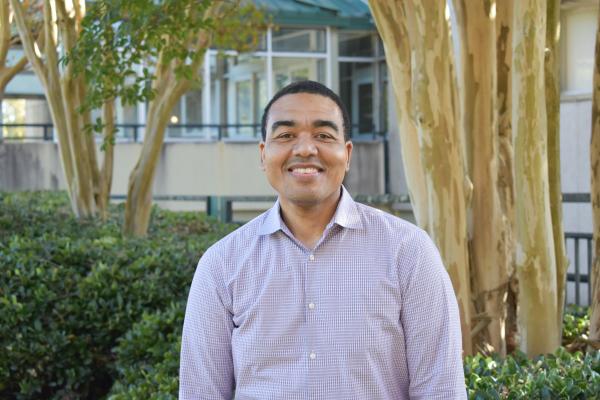
Brian Boyd named director of UNC Frank Porter Graham Child Development Institute
We are pleased to announce that Brian Boyd has been appointed permanent director of the UNC Frank Porter Graham Child Development Institute (FPG).
Boyd, the William C. Friday Distinguished Professor of Education in the UNC School of Education, has been interim director of FPG for the past 14 months, during which the Institute has received funding for more than 35 projects—including Boyd’s most recent NIH-funded project, Racism and Resilience Among Black Autistic Children and Caregivers.
“We are grateful for Brian’s interim leadership,” says Penny Gordon-Larsen, Vice Chancellor for Research, “and excited to continue working with him in this critical role.”
“We are grateful for Brian’s interim leadership,” says Penny Gordon-Larsen, Vice Chancellor for Research, “and excited to continue working with him in this critical role.”
Previously, Boyd served as a professor of Applied Behavioral Science at the University of Kansas, where he also led the Juniper Gardens Children’s Project, a premier research institute known for ground-breaking efforts to improve the care and educational experiences of children over the last half-century. Prior to Kansas, Boyd spent nearly a decade as a faculty member in the UNC Department of Allied Health Sciences, earning tenure and holding research appointments at the Carolina Institute for Developmental Disabilities and FPG.
Boyd’s strong leadership skills and comprehensive understanding of the content and mission of FPG's work have served him, and the Institute, well this past year. Upon assuming the role of interim director, Boyd said that he looked forward to finding meaningful ways to support the talented and dedicated professionals working within FPG—and he has done just that.
“We're absolutely thrilled that Dr. Boyd has been named FPG’s next director. He is a strong, compassionate leader, and he knows and loves FPG,” says Noreen Yazejian, PhD, FPG’s interim associate director for research.
“We're absolutely thrilled that Dr. Boyd has been named FPG’s next director. He is a strong, compassionate leader, and he knows and loves FPG,” says Noreen Yazejian, PhD, FPG’s interim associate director for research. “His commitment to supporting FPG investigators and staff at all levels has been evident during his interim time, and we look forward to continue working with him to build on FPG’s strengths and develop new areas of research, technical assistance, and implementation science to support children and families.”
Over the last year, Boyd has delved into the Institute’s research and evaluation, technical assistance, and implementation science portfolios, getting to know the people driving the work within them. Recognizing and building on existing strengths at FPG, he has crafted a roadmap, FPG Next, which is focused around these three priorities:
- four strategic initiatives: 1) Language and literacy in early development; 2) Innovative technology and data science in education (e.g., AI, wearable sensors); 3) Cultural resilience and wealth of marginalized and underserved communities; and 4) Life course perspective on developmental disability and mental health;
- state engagement; and
- community connections (within FPG and connecting to the broader UNC campus).
Boyd has established a new external advisory board of key thought leaders and experts in fields aligned with the strategic initiatives above to ensure the continued success of FPG. And he worked with the OVCR and the University in the relocation and consolidation of FPG into one building. Boyd believes the move to Spangler, a building much closer to campus, will not only help foster community and increase opportunity for collaboration within the Institute, but also with the larger UNC community.
“I believe that a new building offers new opportunities for collaboration and growth,” says Boyd. “Physical space may not seem as important in a world where people are engaging in more hybrid and remote work, but space helps to anchor us to each other and builds a sense of community and common purpose.”
“I believe that a new building offers new opportunities for collaboration and growth,” says Boyd. “Physical space may not seem as important in a world where people are engaging in more hybrid and remote work, but space helps to anchor us to each other and builds a sense of community and common purpose.”
For almost six decades, FPG has been a leader in generating knowledge, informing policies, and supporting practices to promote positive developmental and educational outcomes for children of all backgrounds and all abilities from the earliest years.
One of the largest pan-campus centers and institutes at UNC, FPG is home to more than 200 scientists, specialists, and scholars working on more than 65 projects covering a broad range of disciplines, including autism and developmental disabilities; physical, social, and emotional health; early care and education; early intervention and special education; racial, ethnic, linguistic, cultural, and socioeconomic diversity; prevention science, and more. The Institute and its people make a daily impact on children and families throughout North Carolina, the nation, and around the world.
“As one of the nation's foremost multidisciplinary centers devoted to the study of children from infancy to adolescence, every day my FPG colleagues and I work to strengthen and accelerate the translation of research to evidence-based practices and policies to help ensure that all children and families thrive,” says Boyd, “And I am thrilled to continue this work together.”
“As one of the nation's foremost multidisciplinary centers devoted to the study of children from infancy to adolescence, every day my FPG colleagues and I work to strengthen and accelerate the translation of research to evidence-based practices and policies to help ensure that all children and families thrive,” says Boyd, “And I am thrilled to continue this work together.”
